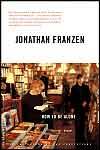 In How To Be Alone, Jonathan Franzen includes the insightful essay, "Imperial Bedroom" addressing the issue of "Privacy, privacy, the new American obsession..." Franzen describes privacy as a kind of two-way street. There's the conventional mode of your own private information being made public - dangerous when a stranger gains your credit card information or embarrassing when people you know see you going into a sex toy store. And there's the opposite intrusion when other people's private actions are thrust in your face - like the salacious details of Clinton's indiscretion in the Times at your breakfast table or the construction worker peeing on the sidewalk.
In How To Be Alone, Jonathan Franzen includes the insightful essay, "Imperial Bedroom" addressing the issue of "Privacy, privacy, the new American obsession..." Franzen describes privacy as a kind of two-way street. There's the conventional mode of your own private information being made public - dangerous when a stranger gains your credit card information or embarrassing when people you know see you going into a sex toy store. And there's the opposite intrusion when other people's private actions are thrust in your face - like the salacious details of Clinton's indiscretion in the Times at your breakfast table or the construction worker peeing on the sidewalk.I'm grappling with the distinction between privacy and anonymity. Franzen describes the 19th century small town where everyone knew each other and observed every movement of each neighbor. I grew up in a 20th century town almost like that. Compare that to Wegman's tracking my shopping habits. They know my every grocery purchase for the last 15 years. But they don't know me, so I don't really care. It's a far cry from the corner druggist, whom I'd see at church on Sunday, knowing I was buying condoms - not that that could have happened when I was a teenager in this small catholic town in the sixties.
But we all deal with privacy and anonymity on the internet. I feel fairly private at home. I live alone. I don't always lock the doors. I don't always close the drapes (details I probably shouldn't reveal). Still, at home I feel comfortable doing pretty much as I like. But I know that a hundred yards away, on the road, I should have clothes on and I should probably refrain from singing and dancing. I know there are things I can say and do in private that would be too much trouble to deal with in public.
Under the heading of "caring what other people think," I used to teach my kids that if they're doing something that they'd have to lie about if questioned, they should examine the possibility that they're doing something wrong. I still think it's a good rule. Ask yourself, "Could I stand up in public and defend this action?"
"Online privacy?" Isn't that an oxymoron? Don't we all know, by now, that the internet is public? There's a certain risk in revealing private information online - whether it's your encrypted credit card account number or the blog details of why you hate your boss. As Franzen points out, "When Americans do genuinely sacrifice privacy... they do so for tangible gains in health or safety or efficiency. " For example, airport security and department store surveillance cameras.
Still, in some areas, like heath and legal records, I understand why privacy is important. There's still a great deal of prejudice against people with certain health problems or arrest records. And there are plenty of things that are simply no one else's business.
P.S. I like that spellcheck wants to make "Wegman's" either hegemonic or awesomeness.

No comments:
Post a Comment